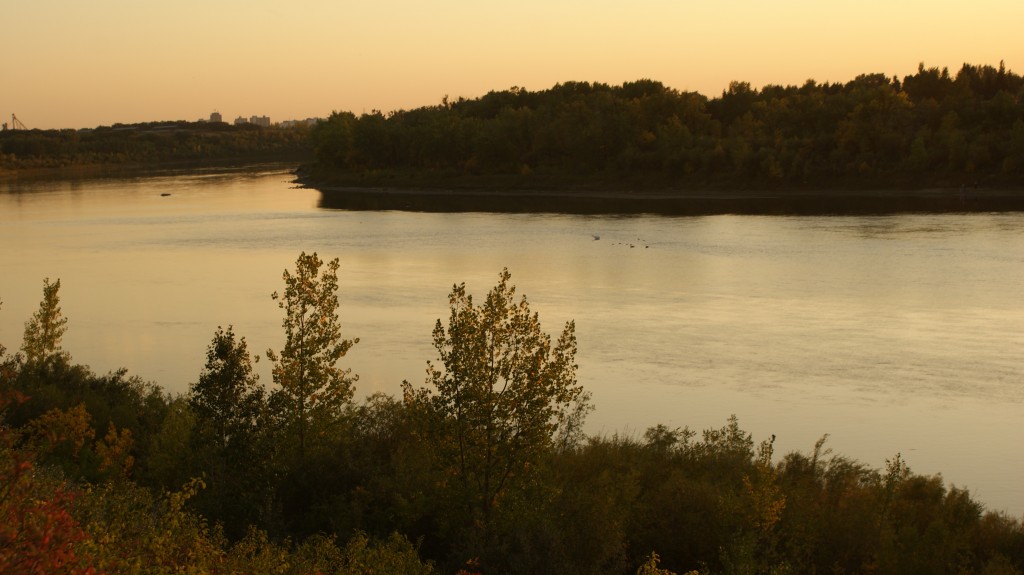Truth and Mercy in the South Saskatchewan Watershed – by Eileen Klassen Hamm
Theological Reflection – Sunday July 28, 2013
Eileen Klassen Hamm is obsessive about cycling, growing food, and reading. She is also the Program Director for Mennonite Central Committee Saskatchewan and adjunct faculty at Bethany College.
I grew up on a farm in Treaty 6 Territory, on the eastern banks of the South Saskatchewan River north of Clark’s Crossing. Coulees, abundant with Saskatoon berry and chokecherry bushes, wildflowers and creatures, were the play structures of my childhood. The rhythm of the seasons connected us to the watershed with its cycles of abundance and respite. On pleasant Sunday afternoons, my brothers and I would bug our Dad to take us to the South Quarter to look for arrowheads. The fields there were quite sandy and often we would find these markers from another time, another people.
As a young adult I left the watershed of my childhood to pursue education, travel, and love. Watersheds in other provinces, countries and continents shaped my vocation and sharpened my understanding of my home. And then I returned, with my love, to the watershed of the South Saskatchewan River. Our children have grown up here, eating Saskatoon berries and chokecherries.
My ancestors came to this watershed from Ukraine in the 1890s with stories of dislocation, losses and hopes. They perceived the landscape to be empty and they set about filling it with fence lines and buildings, plowed fields and future dreams. They failed to understand that the watershed was already rich in stories, and that their relocation was part of the dislocation of Indigenous peoples who thus became strangers in the land of their own ancestors.
In the two decades since I have returned to the banks of the South Saskatchewan River, I have attempted to learn more about broken treaty relationships, Indian Residential Schools, the Doctrine of Discovery. I have attempted to listen carefully to Indigenous stories from this watershed, stories of suffering and strength, despair and resurgence. I witness small signs of hopeful change. But mostly I wonder how best to take responsibility as a settler, an heir of colonialism, an heir of oppression. I wonder how best to honour the beautiful and the tragic stories of the watershed.
Psalm 85 is a cry from a people who have been exiled and are seeking to return to their land and to the Lord’s favour – “Restore us again, O God … Will you prolong your anger through all generations?” The psalm is a plea for peace and justice and well-being. Verse 10 holds an amazing and intimate vision of restoration – “truth and mercy have met together; peace and justice have kissed.”
John Paul Lederach[i], a well-known peacebuilding practitioner and educator, invites justice seeking people to imagine each of these four concepts in Psalm 85:10 – Truth, Mercy, Peace, Justice – as a person, and then to invite these persons into your context. What do Truth, Mercy, Peace, and Justice have to say to my watershed? To the conflict, injustice, and pain that is here? We often pit these concepts against each other, or argue that one needs to happen before another. What wisdom and strengths do they bring as collaborators? Truth seeks acknowledgement, honesty, revelation and clarity. Mercy brings acceptance, grace, compassion and healing. Peace holds harmony, well-being, security and respect. And Justice carries right relationships, equality and restitution.
The psalmist’s vision for restoration has these four teachers/teachings interacting in a dynamic social space. I find this vision energizing as we, in the church, seek to be part of life-retrieving, reconciling stories in our watersheds. In all of our particular places, we can be encouraged to sift through the wisdom of Truth and Mercy, Peace and Justice. At times we may be called to amplify the voice of Truth. To emphasize the strengths of Peace. To learn the hard teachings of Justice. To accept the gifts of Mercy. And we do this all that “faithfulness will spring forth from the earth … and our land will yield its harvest.”
[i] John Paul Lederach, The Journey Toward Reconciliation (Herald Press, 1999), p 51-61.









